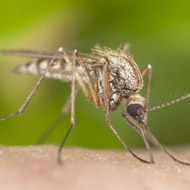
Interviews and laboratory testing of family members underway
An emergency response team has been sent to Utah in the United States to investigate an unusual case of Zika virus.
The Centers for Disease Control and Prevention (CDC) say that the carer of an elderly Utah resident, who died of Zika late in June, has become infected with the disease.
Before now, scientists believed that sexual transmission, mosquitoes and mother-to-child transmission in the womb were the only ways to pass on the virus. But the deceased's carer did not have any of these risks.
“The new case in Utah is a surprise, showing that we still have more to learn about Zika," said Erin Staples, CDC’s medical epidemiologist on the ground in Utah.
“Fortunately, the patient recovered quickly, and from what we have seen with more than 1,300 travel-associated cases of Zika in the continental United States and Hawaii, non-sexual spread from one person to another does not appear to be common."
The CDC say that the deceased had travelled to an area with Zika and tests revealed that he had high amounts of the virus in his blood.
The emergency response team are now investigating how the second Utah resident contracted the virus. The team consists of experts in virology, infection control, mosquito control, disease investigation, and health communication.
Interviews and laboratory testing of family members and carers who may have had contact with the person that died are now underway.



 The latest
The latest